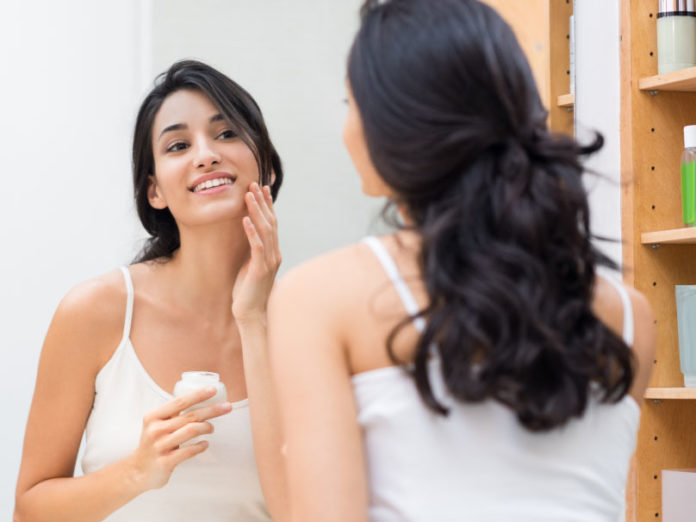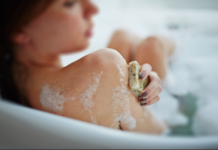By now, many of you have probably heard about the gut microbiome. It’s earned a lot of press in recent years. The unique grouping of microorganisms living in your gut affect everything from your mood to your chances of getting cancer. But, did you know your skin has its own microbiome, too?
Your skin microbiome could be just as important!
Just as we now know there is a whole ecosystem of microorganisms in the human gut, we’re learning that the same is true of our skin. This microbiota plays an important role in healing, allergies, and inflammatory responses.
What’s In the Skin Microbiome?
Your skin, being the largest organ of the body, has room for a lot of residents. These biota are described as “highly diverse and variable.” Let’s take a look at who they are.
Most of the skin microbiome comprises bacteria. Just like the “good” bacteria in your gut, you want to be kind to this bacteria. Killing it off, such as through overuse of topical antibiotics, can allow “bad” bacteria to take over.
Scientists at the University of Pennsylvania tested three ingredients commonly found in antibiotic ointments on mice. Their findings? “All of the antibiotics changed the makeup of the microbial communities, and, in a key finding of the study, the impact of that change lasted for days after treatment stopped.” The antibiotics reduced good bacteria that competes with S. aureus, a common cause of skin infection.
A recent study published in Scientific Reports found that your skin hosts more than bacteria. You also have archaea, especially if you’re over 60. Archaea are microorganisms that thrive in extreme conditions, like intense heat or cold. Science only recently learned that they also live in and on the human body. Researchers are still trying to figure out what they do on our skin. One possibility is that they break down sweat by oxidizing ammonia. They may reduce skin pH, helping fight infection. It will be fascinating to see what researchers learn next about this strange organism and others who live in symbiosis with us.
Your skin may also contain fungi, viruses and even mites. But before you start scratching, let’s take a look at how all of these microorganisms work together to protect you.
How Skin Microbiota Help
Drs. Grice and Segre, published in the National Review of Microbiology, suggested that some of these organisms “educate” your body’s natural defenses. They work by “priming them to respond to similarly marked pathogenic cousins.”
Protect Your Skin Microbiome
Don’t Wash Away the Good
As science learns more about the skin microbiome, we will be able to offer more and better advice. One important step, however, is to avoid overuse of antibiotics. This includes topical antibiotic ointments and hand sanitizer. Also limit the use of any harsh skin care products, including cosmetic, and opt for natural ingredients when you can.
Drs. Grice and Segre wrote, in their previously mentioned report, “Cosmetics, soaps, hygienic products and moisturizers are also potential factors contributing to the variation of skin microbiota. These products alter the conditions of the skin barrier, but their effects on skin microbiota remain unclear.”
Eat a Healthy Diet
Just as eating right benefits the health of your other organs, it also benefits your skin. Include plenty of plant-based, whole foods. Mix in a variety of fermented foods and other probiotic-rich options.
I write a lot about how beneficial probiotics can be for your gut microbiome. The same is true for your skin. Don’t forget to drink plenty of water. Water in your bloodstream hydrates your skin, and bacteria thrive in a moist environment.
Take The Right Probiotics!
For many years, I have recommended probiotics as part of my healthy skin program. Taking the proper strains, amount and balance of probiotics is extremely important. I recommend Diamond Nutritionals’ Probiotic Formula. One capsule a day delivers 20 billion bacteria containing 6 different probiotic strains, along with 2 billion saccharomyces boulardii, a potentiator for good skin microflora.
Exercise
Get plenty of cardiovascular exercise. Of course, this benefits your health in myriad ways, but in case you needed one more, consider this: sweating is good for your skin. Sweat nourishes good bacteria!
Consult a Professional
If anything unusual happens with your skin, consult a physician to learn whether any recent changes in your daily routine may be disrupting your skin microbiome. You may not have considered this as a cause of your particular problem, but when you remember that your skin covers your entire body, you can’t underestimate its role.
Protect Your Children’s Skin, Too
The same guidelines for a healthy skin microbiome in adults apply to children as well. However, you have one critical window of opportunity when a child is born. The skin’s immune system forms within the first hours and days following birth. This is the time when a person’s tolerance to certain pathogens is established for life!
The World Health Organization recommends that babies are not bathed for the first 24-48 hours following birth. Make sure you plan ahead before giving birth so that your hospital follows your wishes in this regard. Also avoid exposing a newborn to any unnecessary antibiotics.
In my practice, I recommend that our pediatric patients take a balanced probiotic formula as well. I recommend Diamond Nutritionals’ Children’s Probiotic Formula for those 12 and under. Just one small scoop a day (1.7 grams) in water, juice or food delivers 5 billion bacteria containing 7 different probiotic strains, along with 1 billion saccharomyces boulardii, a potentiator for good skin microflora.
Treat your skin–and all its residents–with tender loving care, and it will love you in return. This is a promising area of medicine that is almost sure to turn over exciting new findings in the coming years, which can help you live a healthier, happier life.
—
Photo credit: Rido81 / bigstock.com








